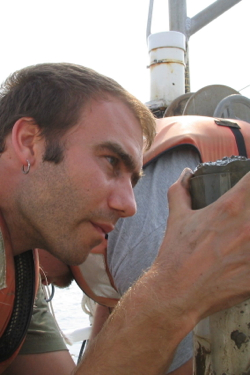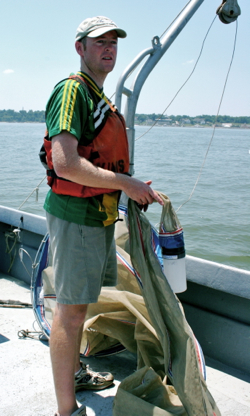Best Student Paper Awards
Each year a committee of faculty and students undertakes the difficult task of choosing the best journal articles from the many high-quality papers written by VIMS graduate students. Each paper considered is either accepted, in press, or published in a high-quality, peer-reviewed journal. The papers reflect the superb quality of the research conducted by VIMS students and the outstanding mentoring of their advisors. Papers are judged for the scope of problem, degree of challenge, magnitude of student’s effort, hypothesis formulation and testing, and writing style.
The committee, which included Richard Brill, Ryan Carnegie, Jennifer Martin, John Milliman, and Kam Tang evaluated 8 papers in both the Ph.D. and Master’s categories.
Master's
 This year’s choice for the best paper by a Master’s student
goes to Patrick Dickhudt for “Mud matrix
solids fraction and bed erodibility in the York River estuary, USA, and other
muddy environments.” His paper appeared in Continental Shelf Research and was co-authored by Carl Friedrichs
and Larry Sanford. Patrick is now a Research Scientist at the U.S.G.S. Coastal and
Marine Science Center in Woods Hole, Massachusetts, and, unfortunately is not
able to attend today’s ceremony. However, Patrick’s advisor, Professor
Carl Friedrichs, is here today to accept Patrick’s Award.
This year’s choice for the best paper by a Master’s student
goes to Patrick Dickhudt for “Mud matrix
solids fraction and bed erodibility in the York River estuary, USA, and other
muddy environments.” His paper appeared in Continental Shelf Research and was co-authored by Carl Friedrichs
and Larry Sanford. Patrick is now a Research Scientist at the U.S.G.S. Coastal and
Marine Science Center in Woods Hole, Massachusetts, and, unfortunately is not
able to attend today’s ceremony. However, Patrick’s advisor, Professor
Carl Friedrichs, is here today to accept Patrick’s Award.
This paper was the second of two first-author articles to result from Pat's Masters Thesis. A major scientific contribution of this 2011 paper was to identify a key property that controls erodibility of mud-sand mixtures, namely the water content of the mud alone. One peer reviewer stated, “I expect that this paper will be cited many times, for many years in the future.” In fact, the two papers from Pat’s Master’s Thesis have each been cited about twice as often as the typical recent paper having VIMS faculty, students or staff as authors.
Ph.D.
 The most meritorious student author in the PhD category is Rob
Condon for “Jellyfish blooms result in a
major microbial respiratory sink of carbon in marine systems.” Rob is now a
Research Senior Marine Scientist at the Dauphin Island Marine Laboratory in
Alabama, and, unfortunately, is not able to attend today’s ceremony. However, Rob’s
Advisor, Professor Debbie Steinberg, is here today to accept Rob’s Award.
The most meritorious student author in the PhD category is Rob
Condon for “Jellyfish blooms result in a
major microbial respiratory sink of carbon in marine systems.” Rob is now a
Research Senior Marine Scientist at the Dauphin Island Marine Laboratory in
Alabama, and, unfortunately, is not able to attend today’s ceremony. However, Rob’s
Advisor, Professor Debbie Steinberg, is here today to accept Rob’s Award.
Rob’s paper appeared in the Proceedings of the National Academy of Sciences, and was co-authored by Debbie Steinberg, Paul del Giorgia, Thierry Bouvier, Debbie Bronk, William Graham, and Hugh Ducklow.
This paper examined the potential of jellyfish to drastically alter marine food webs by shunting food energy away from fish and toward bacteria. These results combined with the apparent increase in the size and frequency of jellyfish blooms in coastal and estuarine waters around the world during the last few decades means that the impact of jellies on marine food webs is likely to increase into the future. The paper’s impact on the general public is reflected in the hundreds of articles it generated in the popular press.
The submitted papers once again demonstrate the high quality and broad reach of our students’ work.
Congratulations, Pat and Rob!
